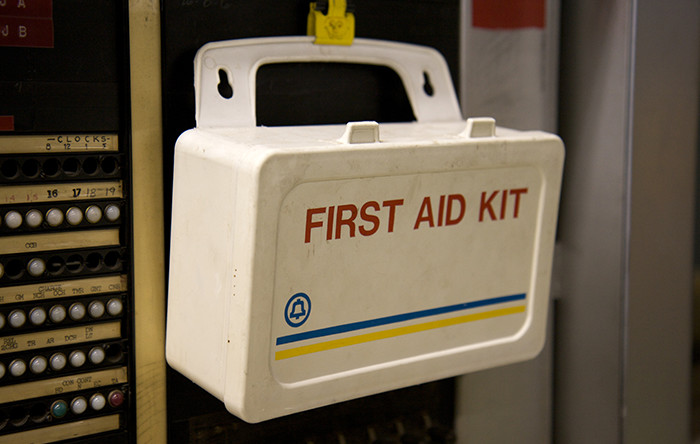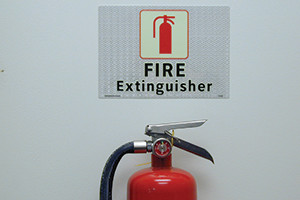Is your house as safe as it can be? From toxic plants to carbon monoxide, dangers can be lurking within your home. Protect your family—from everything from fires and natural disasters to cuts and scrapes—with these safety must haves for every home.
Your home is your haven, make sure it’s a safe one.
- Fire extinguisher
Having a fire extinguisher at the ready when flames break out can be the difference between a small fire and one that can do major damage. Place a fire extinguisher on each level of your home, as recommended by the National Fire Protection Association.
Fire extinguishers come in different sizes. While a larger one packs more punch, consider smaller ones, too, that are easier to maneuver. Look for extinguishers labeled A:B:C, which means they fight the three types of fires (combustibles, electrical, flammable liquids).
Where to buy: Home Depot, starting at $19
- First Aid Kit
If you don’t have one already, it’s time to make a first aid kit and have it ready for use at home and on the road. Include:
- Medical information and histories for all family members
- Products to treat cuts, burns, allergies, sprains and strains, skin and bowel irritation, stings, coughs, and colds
- Latex gloves
- Flashlight and batteries
- For traveling, include enough medicine for more days than you are on the road.
Group items together and seal in plastic bags, then use a water-resistant bag or container for your kit. At home, keep the kit in the kitchen, and on the road keep a kit in your car, and one in your suitcase.
Where to buy items: CVS

- Wifi Thermostat
Heating and cooling costs can be a real drain on your wallet. But with a Wifi thermostat such as the third generation Nest Learning Thermostat, you can save an average of 10 to 12 percent on your heating bills, and 15 percent on cooling. The thermostat learns what temperature you like at different times of the day, and builds a schedule accordingly. No setting it and forgetting to turn it up or down.
The best part is, you can control the thermostat remotely. Out of town during a deep freeze? Turn up the heat to ensure your pipes don’t freeze. Or, turn the cool air up a few degrees on a really hot day, right before you get home from work.
Where to buy: Nest Learning Thermostat, $249
- Non-Toxic Houseplants
Who knew that some of the plants in your house could be a danger to dogs, cats, and even your children? Amaryllis, ivy, and peace lily are all plants you should avoid. If you’re not sure whether plants in your home are toxic, look them up online, or ask at a local nursery. If a child ingests a plant you think is toxic, call poison control immediately.
Which plants can you safely have at home? A few varieties include:
- Fittonia
- Baby rubber plants
- Spider plants
- Blue Echeveria
- Bamboo
- Areca or Golden Palm
- Burro’s Tail or Lamb’s Tail
- Christmas Cactus
- Cliff Brake or Button Fern
- Hens and Chickens
- Pearl Plant
- Pony Tail Palm
- Spice Orchid
Where to buy: Lowe’s, spider plant, $6
- Disaster Kit
Beyond a first aid kit for emergencies, be prepared for the absolute worst with a disaster kit. Some safety must haves for every disaster kit include:
- First aid kit
- Important documents
- One gallon of water per family member
- Three days of food per family member
- Medication
- Clothing and outdoor gear
- Hygiene products
- Blankets
- Cash
- Matches
- Batteries
- Lanterns
Where to buy: REI, Camping lanterns starting at $10
- Smoke and Carbon Monoxide Alarm
Talk about keeping your family safe—the Nest Protect smoke and carbon monoxide alarm has an industrial-grade smoke sensor, the most accurate carbon monoxide sensor available, and lasts for up to 10 years. It tests itself automatically, and you can get alerts sent to your phone.
It also has cool features like lighting up at night when you walk underneath it, and it knows the difference between steam from your shower and a real fire.
Where to buy: Nest Protect, $99
Looking for more information on smoke alarm safety? Read these 7 lifesaving tips every parent should know.
- Emergency Contact Lists
It can only take a split second for an emergency to strike, and having emergency contact lists at the ready is vital. With Cozi Gold, you can keep your list current, print copies for home and the babysitter, and have it online at your fingertips when you need it.
Who should you include on your list? For all family members, list phone numbers and names for:
- Doctors (include allergy info and medical conditions)
- Dentists
- Poison control
- Veterinarians
- School or childcare info
- Household contacts
- Health insurance info and phone numbers
- Parental contact info, including home, work, and cell phones
- Contact info for family, friends, and neighbors who can be trusted to help in an emergency
Where to buy: Cozi Gold, $29.99/year
- Real Deadbolts and Locks on Doors
Don’t wait until your home gets broken into to learn why you should upgrade your deadbolts and locks. Traditional locks don’t always protect from lock-pickers, doors being kicked in, or other forced entry.
The Ultimate Lock can withstand 4,000 pounds of force on a standard wooden door, and a six-pin high security cylinder, to prevent lock picking and bumping.
Where to buy: Ultimate Lock, starting at $80
If you’re looking for more than just deadbolts and locks, read up on how to choose a home security system before you buy.
As a parent, protecting your loved ones is of the utmost importance. By following these eight safety must haves for every home, you can make your home a more safe and comfortable place for everyone.



